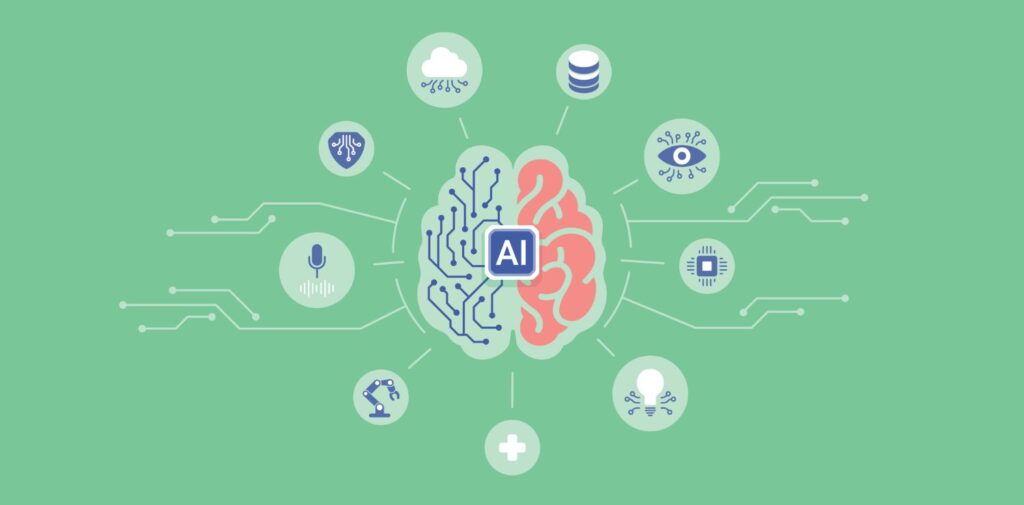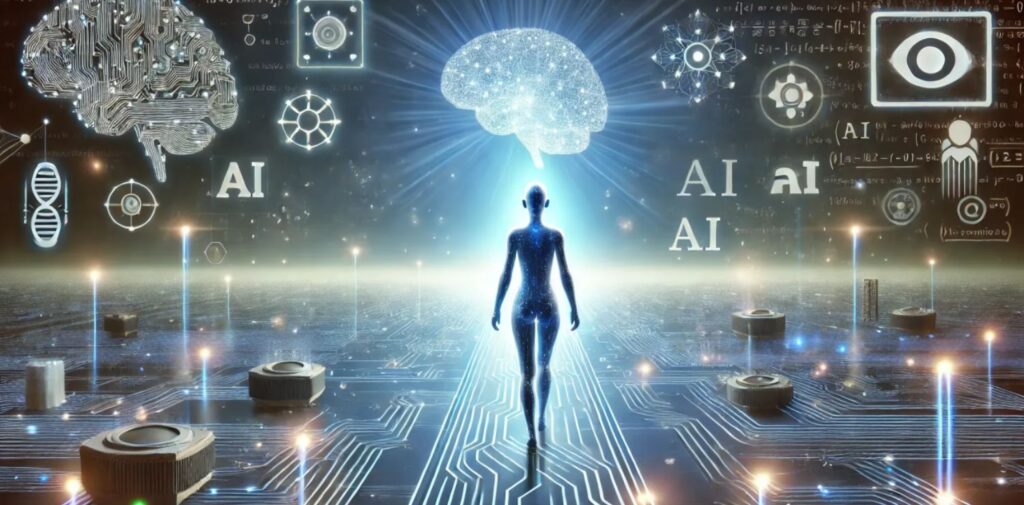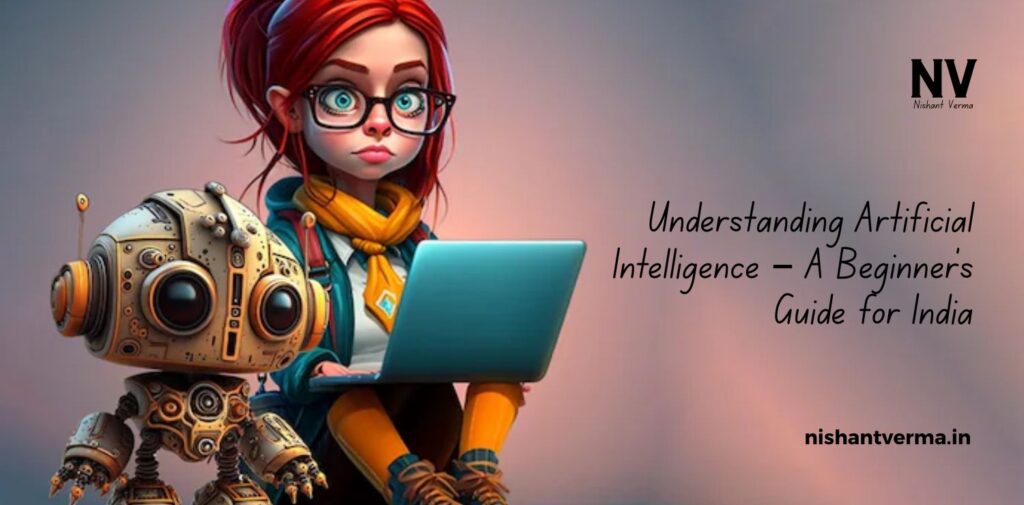In today’s digital world, you must have heard about the term “Artificial Intelligence” or simply “AI”. From smartphones to smart assistants like Alexa, from online shopping suggestions to self-driving cars – AI is changing our world rapidly. But what exactly is Artificial Intelligence? How does it work? Is it something we Indians should be excited about or worried about? Let’s understand all this in a very simple and practical way.

What is Artificial Intelligence in Simple Words
Artificial Intelligence means making machines or computers think and act like humans. Just like we learn from our experiences, AI allows machines to learn from data and make decisions. It is a part of computer science that helps machines become “smart”.
Imagine you are teaching a child how to recognize fruits. First, you show them pictures of apples, bananas, and mangoes. Slowly, they learn to identify the fruit by its shape, color, and size. In the same way, AI learns from large amounts of data and then starts recognizing patterns.
For example, when you shop online on platforms like Amazon or Flipkart, and it suggests products you may like – that’s AI at work. When you use Google Maps to find the best route – AI is helping you by analyzing traffic data. Even spam filters in your email use AI to detect unwanted messages.
Why AI Matters for India
India is a country with a huge population, and we have many challenges – in education, healthcare, farming, and traffic, to name a few. AI can help solve many of these problems. Let’s take a few examples:
In agriculture, AI can help farmers know when to plant, how much water to use, and how to protect crops from pests. Apps powered by AI can give weather updates and even analyze soil health.
In healthcare, AI can help doctors detect diseases like cancer in early stages through scanning reports. It can also help in managing large amounts of patient data in hospitals.
In education, AI can make learning more personalized. Apps like Byju’s and Vedantu already use AI to understand what a student knows and what they need to focus on more.
In cities, AI can help manage traffic signals smartly to reduce traffic jams. It can also help in identifying crime-prone areas to improve safety.
So, AI is not just for big companies or rich countries. It can bring real change in the lives of common people in India.
Types of Artificial Intelligence
AI is not just one thing – it comes in different forms. Mainly, there are three types:
- Narrow AI – This is AI that is designed to do one specific task. For example, Siri in your phone or a chatbot on a website. They are smart, but only in one area.
- General AI – This is more advanced AI that can think and solve problems like a human. Scientists are still working on this. We are not there yet.
- Super AI – This is the future, where machines might become smarter than humans. Right now, it’s just an idea, and many experts are discussing whether it’s safe or not.
Most of the AI we use today is Narrow AI – useful, but under human control.

How Does AI Actually Work
You might wonder, how can a machine “learn” or “think”? Well, AI uses a system called Machine Learning. It means feeding the computer a lot of data and letting it find patterns and make decisions based on that.
Let’s say you want to make a machine that recognizes pictures of cats. You give it thousands of images – some of cats and some of other things. The machine studies these images and learns how a cat usually looks. Next time you show it a new picture, it can guess if it’s a cat or not.
Deep Learning is a special part of Machine Learning where machines use a structure like the human brain, called a neural network. This helps the machine understand more complex things, like voice recognition or driving a car.
AI also uses Natural Language Processing (NLP), which helps computers understand human language. This is how tools like Google Translate or voice assistants work.
How AI is Already a Part of Our Daily Life
Even if you don’t realize it, AI is already around you. Let’s see some examples from everyday life in India:
- Google Assistant or Alexa speaking in Hindi
- Online customer service chatbots in apps like Paytm or Swiggy
- Voice typing in WhatsApp or Gmail
- Face unlock in smartphones
- UPI fraud detection systems used by banks
- Personalized recommendations on Netflix or YouTube
These things are possible because of AI. As technology grows, we will see even more of it in areas like farming, delivery by drones, and even in courts to speed up case management.
Future Scope of AI in India
India has a great opportunity to grow in the field of AI. With our strong IT talent and large amounts of data, we can become a global leader in AI innovation.
The government of India is also supporting AI development. There are projects like National AI Mission and partnerships with tech companies. AI education is being promoted in schools and colleges through platforms like NITI Aayog and CBSE’s AI curriculum.
Young Indians who learn AI now can find exciting jobs in the future – from data scientists to AI engineers. Startups working on AI are also growing in cities like Bengaluru, Hyderabad, and Pune.
The fields of robotics, AI-driven healthcare, fintech, edtech, and agritech are all opening new doors for Indian youth.
Challenges and Things to Keep in Mind
With all its benefits, AI also has some challenges. People worry that machines may take away jobs. But it’s important to understand – AI may remove some jobs, but it will also create many new ones. The key is to learn new skills and stay updated.
Another challenge is data privacy. AI needs a lot of data to work well, so protecting personal data is very important. India is working on laws and digital rights to keep this under control.
Ethical issues like fairness, bias, and decision transparency also need to be discussed. For example, if an AI system is used to select candidates for a job, it must be fair and not favor any gender or caste.

How You Can Start Learning AI
If you are curious about AI, you can start learning even from home. Many websites offer free or low-cost courses in Hindi and English. Platforms like Coursera, Udemy, and YouTube have beginner-friendly AI lessons.
For school students, CBSE has introduced basic AI as a subject. College students can look for AI specializations in computer science or data science.
If you’re not from a technical background, no need to worry. You can still understand how AI is changing the world and use AI-powered tools in your job or business.
Conclusion – AI is the Future, Be Ready
Artificial Intelligence is not just a fancy technology – it’s becoming a part of our daily lives. For a country like India, AI offers huge potential to grow, improve services, and solve real-life problems. Whether you are a student, a working professional, a farmer, or a homemaker – AI will touch your life in some way.
So instead of being afraid of it, we should try to learn about it and use it in the right way. The future belongs to those who understand technology and use it for good.




